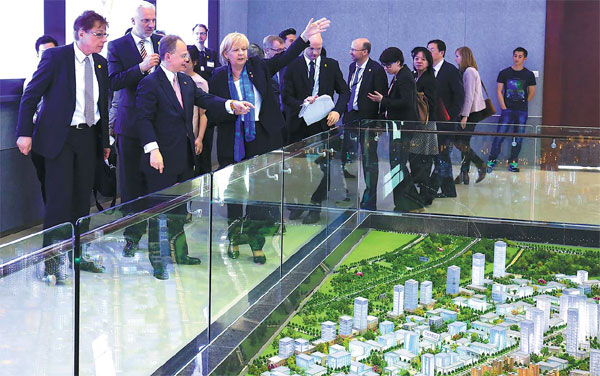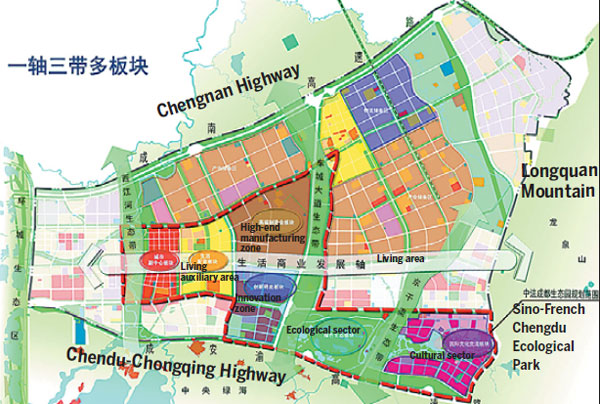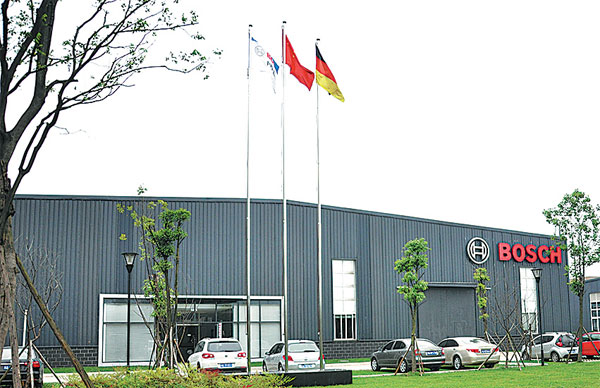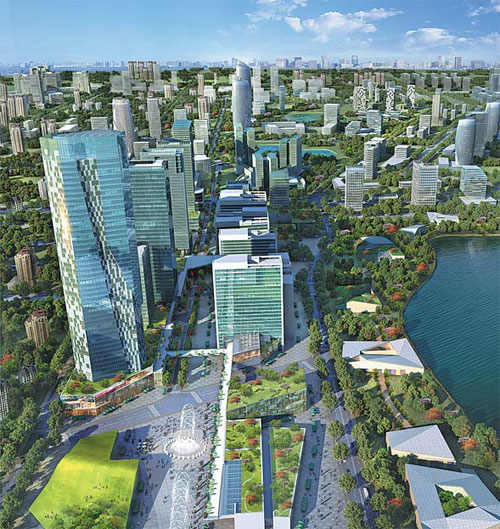High-tech zone magnet for investment
Updated: 2016-01-01 08:17
By Li Yu(China Daily Europe)
|
|||||||||||
City's industrial cluster strategy pays dividends
Premier Li Keqiang and South Korean President Park Geun-hye reached a consensus during Li's visit to South Korea in October last year that the two sides will increase cooperation in innovation, intelligent manufacturing and R&D in high-end technology.
And the two sides made a major step forward a month later with the announcement that a Sino-South Korean Innovation Park is to be formally established in Chengdu, capital of Sichuan province, the major economic center in China's western region.
|
Hannelore Kraft (center, first row), governor of the German state of Nordrhein-Westfallen, pays a visit to Chengdu in April and attends the signing ceremony for the NRW-Centers (Deutschland), which will become the headquarters for German enterprises in western China and serve as a major platform for economic and cultural exchanges between German enterprises and southwestern China. Wang Jichuan / For China Daily |
|
Rendering of the Sino-French Chengdu Ecological Park. Provided to China Daily |
|
The Bosch plant in the Sino-German (Pujiang) SME Cooperation Park. |
|
An illustration of Singapore-Sichuan High-tech Innovation Park, which is under construction in the city. |
Comprising an innovation venture incubation platform and an industrial park, the new innovation park will be located in the Chengdu High-tech Industrial Development Zone.
The project aims to become a major innovation venture center with a global reputation through coordinated R&D activities and industrial cooperation between enterprises of the two countries.
A number of major South Korean companies, such as Hyundai Motor Co, SK Group and Lotte Department Store, already have a presence in Chengdu. Woori Bank, South Korea's second-largest commercial bank, has a branch in Chengdu.
To further facilitate trade and investment, a direct flight from Chengdu to Seoul, capital of South Korea, was opened in July last year by Air China. It is the third direct air route between the two cities and there are 10 flights a week, the busiest among China's western cities.
By August last year, statistics indicated that 243 South Korean companies have invested in Sichuan, with automaking, food, pharmaceutical, culture and finance the main industries for investment.
Among the Global 500 enterprises that have investments in Sichuan, 11 are from South Korea.
Enterprises from other countries have also invested heavily in Chengdu, and the city has industrial zones for German and French corporate clusters.
Chengdu is home to the Sino-German Small and Medium-sized Enterprise Cooperation Park, and Sino-French Ecological Park.
In April last year, the German state of Nordrhein-Westfallen launched a major investment project, valued at 2 billion yuan ($310 million), in Chengdu. It will become the headquarters for German enterprises in western China and serve as a major platform for economic and cultural exchanges between German enterprises and southwestern China.
The Singapore-Sichuan High-tech Innovation Park is also under construction in the city and construction of investment projects by Singaporean enterprises, such as the Hong Leong Group, will be launched in the city this year.
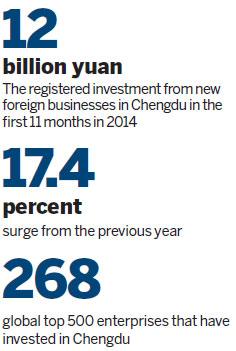
Having attracted heavyweight investors from South Korean, Singapore and European countries, Chengdu has become a major platform for economic opening-up and an important link in the country's Belt and Road Initiative, analysts said.
Industry clusters
Chengdu attaches great importance to the introduction of investor clusters instead of individual enterprises. For example, after its Sino-French Ecological Park inked a deal with Dongfeng Peugeot Citroen Automobile Co Ltd to establish a production base, about 30 companies engaged in related industries, such as France-based Faurecia, Dongfeng Motor Die and Mould Co Ltd and Fengshen Logistics, established investments in the park.
Moreover, the park has introduced high-end manufacturing, environmental protection and energy saving companies, commercial services, culture and corporate incubation projects to enrich the industrial landscape of the park and provide more growth engines for the regional economy.
Such a strategy, which focuses on establishing industrial parks for clusters of enterprises in the same industrial chain, has made Chengdu more attractive to investors, analysts said.
In Pujiang county, for example, 40 enterprises that engage in precision machines and related industries have established investment projects in the Sino-German (Pujiang) SME Cooperation Park, including Bosch Power Tools and Bosch Packaging Technology.
"The establishment of the SME cooperation park opened a door for Pujiang's foreign cooperation," said a spokesman of the county's investment promotion bureau. "Cooperation in the training of workers and managers has greatly improved the level of our technology in the hardware industry."
Such a business cluster-oriented strategy has also contributed enormously to local coffers. The Dongfeng Peugeot Citroen project is expected to contribute about 7 billion yuan a year in tax revenues to Chengdu.
Top investment destination
Investors have chosen Chengdu because of the city's brisk economic growth, favorable investment environment and convenient transport facilities, analysts said.
Chengdu ranked first in the annual most attractive cities for investors list compiled by Global Times this year.
It has also been listed by Fortune magazine as one of the top 10 cities for starting a business in China.
In terms of transport network, Chengdu has 85 international and regional air routes, and Chengdu Shaungliu International Airport has a passenger throughput of 40 million, making the city an international transport hub in the region.
The registered investment of new foreign businesses in Chengdu reached 12 billion yuan in the first 11 months last year, up by 17.4 percent year-on-year.
Now 268 Global 500 enterprises have invested in Chengdu, and it has become a major base for the auto and electronics industries.
About 80 percent of the world's iPads, 50 percent of the world's notebook chips and 20 percent of the world's notebooks are made in Chengdu.
liyu@chinadaily.com.cn
( China Daily European Weekly 01/01/2016 page16)
Today's Top News
Storm Frank batters northern Britain
Over 1 million refugees fled to Europe by sea in 2015
Germany to spend 17b euros on refugees in 2016
Demand booms for high-end financial talent
Abe expresses apology for Korean victims of comfort women
North China encounters gas supply shortage
Asian Infrastructure Investment Bank launched
Russia says it has proof of Turkey's support for IS
Hot Topics
Lunar probe , China growth forecasts, Emission rules get tougher, China seen through 'colored lens', International board,
Editor's Picks

|

|

|

|

|

|
